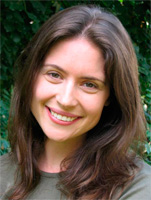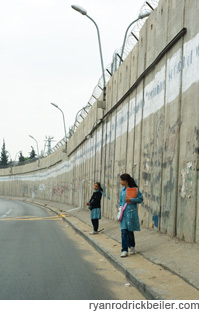 Just the basic facts about Anna Baltzer make her a provocative presence. She's a 30-year-old Jewish-American woman who is arguing passionately for justice for Palestinians.
Just the basic facts about Anna Baltzer make her a provocative presence. She's a 30-year-old Jewish-American woman who is arguing passionately for justice for Palestinians.
But she mixes her passion with a crisp description of life in the Occupied Territories of Gaza and the West Bank, a story of personal transformation, and a disarming charm. She is crisscrossing the country to make the case not only for a better future for the Palestinians but also for active non-violent resistance as a way to achieve that. She is doing this on her own, although she is allied with a number of groups that share her viewpoint.
Baltzer argues that the Israeli government policies in the occupied territories run counter "to the tradition of social justice that has been the pride of many Jewish people, including myself." She acknowledges the fears in Israel from Palestinian terrorist acts over the years, but says the politics of Israel have played to those fears over ideals.
 Her description of occupation is familiar to those who have followed the Middle East saga in recent years: Israeli settlements dot the landscape in the Palestinian West Bank. A separate system of roads in the West Bank segregate Israelis and Palestinians. Israeli army checkpoints throughout the West Bank make movement to work, schools, clinics and hospitals very difficult for Palestinians. A separation barrier being built along the 425-mile line between Israel and Palestine often snakes into Palestinian lands.
Her description of occupation is familiar to those who have followed the Middle East saga in recent years: Israeli settlements dot the landscape in the Palestinian West Bank. A separate system of roads in the West Bank segregate Israelis and Palestinians. Israeli army checkpoints throughout the West Bank make movement to work, schools, clinics and hospitals very difficult for Palestinians. A separation barrier being built along the 425-mile line between Israel and Palestine often snakes into Palestinian lands.
In the U.S. -- Israel's primary political and financial backer since its creation in 1948 -- there has been little room in political dialogue for a defense of the Palestinians. The transformation Baltzer went through, however, is similar to what is happening on a broader scale in this country, although hers is distinctive because of her own heritage.
Her grandmother fled Europe and most of her family was killed in the Nazi Holocaust. She saw Israel as the safe haven for Jews in the future.
When Baltzer went to Turkey to teach English in 2002, she accepted that understanding of Israel as a safe haven. As she traveled around the Middle East, she began to hear the stories of the Palestinians displaced by the creation of Israel and then of Israel's treatment of Palestinians in the occupied territories. What she heard was at odds with how she thought the world should be.
As a volunteer with the International Women's Peace Service, she went to the West Bank to document human rights abuses. She took photos, wrote a book, Witness in Palestine, and for the last few years, has been speaking full-time about the conditions in the West Bank. She has been trying to inspire people to take action to change U.S. policies that might in turn change Israeli policies.
Last week, she was in the Madison, Wisconsin, area talking to service clubs, church groups, and students; she reached nearly 1,000 people in person, plus more through radio interviews. She found not only receptivity to her viewpoint, but also people interested in knowing what they could do.
That's the point for her -- to get people involved as well as informed. "The goal is not sympathy," she says. "It's change. Palestinians don't need more people feeling sorry for them. They need people to take action."
She offers simple steps -- learning about the situation, supporting groups working for change like Five for Palestine and the American Association for Palestinian Equal Rights, maybe even visiting Israel and Palestine, and certainly contacting members of Congress.
In some ways, Baltzer personifies the small shifts in the political landscape over the situation in Israel and Palestine. She certainly gets plenty of heat from the more-established Jewish groups in this country, but her own movement -- from unquestioning support for Israel, to skepticism of what the Israeli and U.S. governments are doing, to a willingness to push for an end to occupation -- forms a familiar pattern in the growing pressure for change in the untenable status quo in the Middle East.
Phil Haslanger is pastor at Memorial United Church of Christ in Fitchburg, Wisconsin. His e-mail is phaslanger@gmail.com. Learn more about Anna Balzer at www.annainthemiddleeast.com.
Got something to say about what you're reading? We value your feedback!